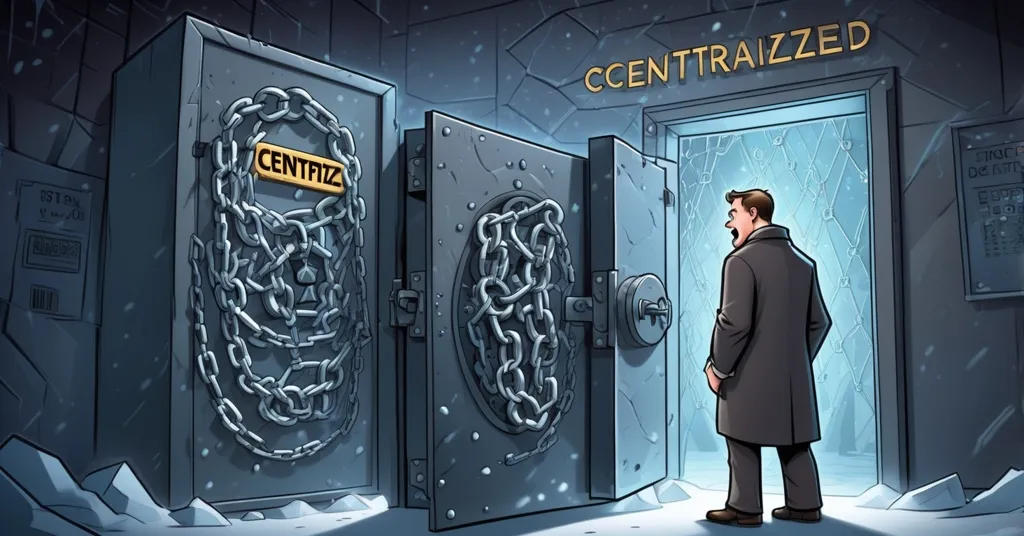LBank Frozen Funds Scandal: Centralized Exchanges’ Trust Crisis Explodes

LBank Slammed for Frozen Funds: Centralized Exchanges Face Trust Meltdown
LBank, a centralized cryptocurrency exchange popular for trading viral meme tokens, is catching serious heat as a surge of user complaints over frozen funds exposes cracks in its operations. With traders locked out of their money—sometimes six-figure sums—after profitable trades, accusations of shady practices are piling up, reigniting debates over the risks of centralized platforms in the crypto space.
- Massive Backlash: Around 40 complaints in 2025 report frozen funds on LBank, with affected amounts from $350 to six figures.
- Profit Hunters Targeted: Successful traders face account locks, often cited for vague rule breaches after big wins like 10X returns.
- Systemic Rot: Crypto sleuth ZachXBT ties LBank to other dodgy exchanges like MEXC, hinting at a deeper “bucket shop” scheme.
- Liquidity Doubts: Freezes may mask cash flow issues, raising red flags about LBank’s financial health.
LBank Under Fire: A Frozen Funds Nightmare
LBank has carved out a niche as a go-to platform for speculative assets, particularly meme tokens like PNUT, which exploded with record trading volume in 2024. Boasting some licensing in the USA and catering to a global user base, it handles significant daily trades—often in the millions—making it a notable player despite not matching the scale of giants like Binance. But beneath the surface, trouble brews. As of 2025, at least 40 users have publicly complained about frozen funds on LBank, though the real tally could be far higher given the reluctance or inability of some to go vocal. The stakes aren’t trivial: frozen amounts per account span from a painful $350 to a gut-wrenching $10,000, with high-profile cases reaching into six figures.
The stories are grim. Traders report executing successful trades—sometimes scoring 10X gains on volatile meme tokens—only to find their accounts locked when they try to withdraw. LBank’s justifications often feel like moving goalposts: some users are told their Know Your Customer (KYC) verification, a process requiring personal ID to comply with anti-money laundering laws, is incomplete. Others, in about 40% of cases, are flagged for violating “travel and location rules”—restrictions on where users can be based or travel to—that many claim were never clearly outlined. Then there are freezes tied to specific market shocks, like the de-pegging of xUSD, a stablecoin that lost its intended 1:1 tie to the US dollar, triggering chaos across platforms. One trader, Param (@Param_eth), became a rallying cry for the frustrated after their six-figure balance got trapped following PNUT trades.
“I need help from the Web3 community…. LBANK FROZEN MY FUNDS in 6 figures. Please help everyone with this post so I can get justice.” – Param, November 4, 2025
Param’s desperation isn’t unique. Social media is awash with similar tales of locked accounts and radio silence from LBank’s customer support. It’s the kind of nightmare that makes you wonder: are centralized exchanges (CEXs) just modern-day bank vaults where “your money” is theirs until they say otherwise?
ZachXBT Drops a Bombshell: A Network of Shady Exchanges?
Enter ZachXBT, a crypto investigator with a knack for sniffing out fraud in the blockchain world. Known for exposing scams and shady operators, ZachXBT has turned the spotlight on LBank with allegations that go beyond isolated incompetence. According to their findings, LBank might be part of a larger web of centralized exchanges sharing ownership and dubious tactics.
“Allegedly one of the larger shareholders for LBank also owns MEXC / WEEX. A lot of these sketchy bucket shop exchanges have a ‘big boss’ behind the scenes who runs it all. Trading against users and freezing profitable traders seems to be a part of their business strategy.” – ZachXBT, November 5, 2025
That’s a bombshell. By “bucket shop,” ZachXBT means a scam-like operation historically tied to gambling dens that bet against their own clients, ensuring the house always wins. If true, this suggests LBank—and alleged siblings like MEXC and WEEX—might deliberately freeze accounts of profitable traders to dodge payouts. It’s not a stretch to speculate this could stem from liquidity shortages, where the exchange lacks the cash to cover withdrawals after big user wins. Past incidents bolster this theory: MEXC has faced near-identical complaints over frozen funds, as has Ourbit, another smaller player that’s gone viral for restricted accounts. While hard evidence of shared ownership remains unconfirmed, the pattern of behavior across these platforms is hard to ignore. Are we looking at a systemic hustle where CEXs play casino with user funds?
Centralized Exchanges: Convenient, But Flawed
For the uninitiated, centralized exchanges like LBank are platforms where users trade cryptocurrencies—Bitcoin, Ethereum, or wildcards like meme tokens—under the oversight of a single entity. Unlike decentralized exchanges (DEXs), which run on blockchain smart contracts with no middleman and let users retain control of their funds, CEXs hold your crypto in their wallets. That means they’ve got the keys, and as LBank users are learning, that also means they’ve got the power to lock you out on a whim.
The allure of CEXs is undeniable, especially for newcomers. They’re user-friendly, offer high liquidity for quick trades, and often support exotic assets or advanced tools like futures trading that DEXs can’t always match. LBank, for instance, has been a hotspot for PNUT meme token trading, a niche Bitcoin doesn’t touch nor should it. But the trade-off is stark: when a platform controls your funds, you’re at their mercy. The ghost of FTX’s 2022 collapse still looms large—its implosion, driven by mismanagement and fraud, wiped out billions and left users stranded. That disaster shifted the crypto zeitgeist, ramping up scrutiny of CEX transparency and pushing regulators to hover closer. Every LBank freeze, every unanswered support ticket, feels like an echo of that betrayal, chipping away at trust in centralized systems.
Lessons for Crypto Traders: Protect Your Funds
So, what’s a trader to do when even a licensed platform like LBank can pull the rug? First, let’s talk self-custody—taking control of your crypto by holding it in a personal wallet rather than leaving it on an exchange. Hardware wallets like Ledger or Trezor are gold standards here: they’re physical devices storing your private keys offline, safe from hacks or CEX freezes. Setup is straightforward but demands diligence—lose your seed phrase (a recovery code), and your funds are gone for good. Software wallets, like MetaMask, work for smaller amounts or active trading, though they’re riskier if your device gets compromised.
Then there’s the DEX route. Platforms like Uniswap or PancakeSwap let you trade directly from your wallet via blockchain protocols, no middleman needed. The catch? They’ve got a learning curve—connecting wallets, understanding slippage, and navigating gas fees (transaction costs on networks like Ethereum) can frustrate beginners. Plus, liquidity for niche tokens might be thinner than on a CEX. Still, the trade-off for control can be worth it. Start small, test the waters, and never store more on an exchange than you’re willing to lose. Researching a platform’s track record—user reviews, past scandals, or withdrawal issues—before depositing is non-negotiable. The LBank mess shows why “not your keys, not your crypto” isn’t just a Bitcoin maximalist mantra; it’s survival.
Bitcoin, Altcoins, and the Push for True Freedom
Zooming out, the LBank debacle throws fuel on the ideological fire between Bitcoin’s purist vision and the altcoin playground. Bitcoin maximalists—those who see BTC as the only true decentralized currency—will smirk at this mess, pointing to Bitcoin’s design as immune to CEX shenanigans. Built on a trustless, peer-to-peer network, Bitcoin empowers users to be their own bank, sidestepping centralized gatekeepers. It’s not about 10X meme token pumps; it’s about financial sovereignty. Meanwhile, altcoin enthusiasts and smaller exchanges like LBank fill niches Bitcoin doesn’t—speculative plays, experimental tech, or community-driven tokens like PNUT. That diversity drives innovation, no question. But when a CEX catering to altcoins starts freezing funds, it taints trust across the board, making Bitcoin’s “screw the middleman” ethos look ever more appealing. Both camps agree on one thing: decentralization isn’t just a buzzword; it’s the antidote to corporate overreach.
What’s Next for LBank—and Centralized Exchanges?
LBank’s future hangs in a precarious balance. If user pressure mounts, as it did with MEXC—where trader The White Whale clawed back funds on October 31, 2025, after a months-long fight—we might see policy shifts or begrudging payouts. But without accountability, don’t hold your breath. Regulatory eyes could turn sharper, especially with LBank’s USA licensing; a few lawsuits or a viral campaign might force action. Worse, if liquidity issues are the root, as ZachXBT implies, we could witness a slow-motion collapse, with more users trapped in limbo. The ripple effect matters too: every frozen account pushes traders toward DEXs or self-custody, potentially shrinking CEX market share. For now, the ball’s in LBank’s court to prove it’s not just another predator in a space hungry for trust. Until then, the community must demand transparency and keep exposing bad actors—because if we don’t, who will?
Key Questions and Takeaways on the LBank Controversy
- What’s causing LBank to freeze user funds?
Officially, it’s incomplete KYC, location rule breaches, or trading violations, but suspicions point to liquidity gaps or a tactic to avoid paying out big wins. - Is LBank alone in these shady practices?
No, exchanges like MEXC, WEEX, and Ourbit face similar gripes, with ZachXBT suggesting shared ownership and a “bucket shop” playbook across them. - Why are profitable traders getting hit hardest?
Freezing accounts post-big gains may be a strategy to dodge withdrawals, possibly due to cash flow issues, as alleged by crypto investigators. - Can users get their frozen crypto back from LBank?
It’s tough but doable—public outcry worked for MEXC’s The White Whale, though LBank’s unresponsive support leaves many, like Param, stuck. - How does this damage trust in centralized exchanges?
Each incident fuels distrust, spotlighting the risks of CEX control and nudging users toward self-custody and decentralized alternatives for Bitcoin and altcoins. - How can crypto users shield their funds from CEX risks?
Embrace self-custody with hardware wallets, explore DEXs like Uniswap, and always vet exchange reputations before depositing—never risk more than you can lose.
The LBank saga cuts deep, exposing the ugly underbelly of centralized power in a space born to defy it. We’re all here for the promise of Bitcoin and blockchain—financial freedom, disruption of broken systems, and a middle finger to gatekeepers. But when platforms like LBank play fast and loose with user money, that vision gets muddied. Community pressure can force change, as MEXC showed, but relying on outrage to access your own funds is a lousy status quo. Let’s keep pushing for a decentralized future where user sovereignty isn’t negotiable. If LBank and its peers can’t clean up their act, they’ll be relics in a revolution that’s already outgrowing them. Time to take control—your keys, your crypto, your power.



